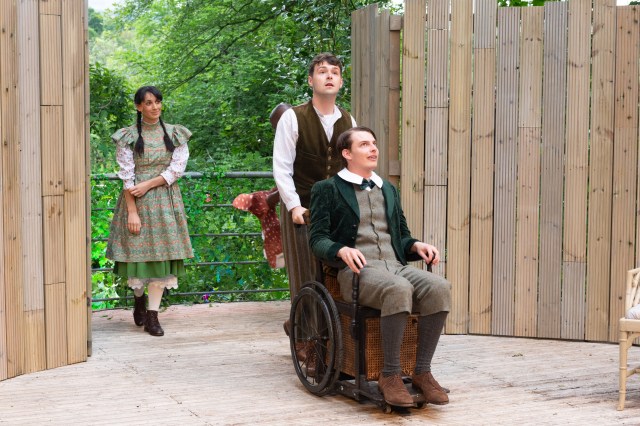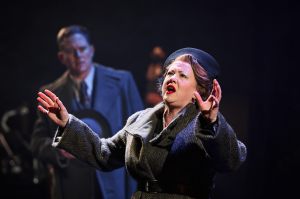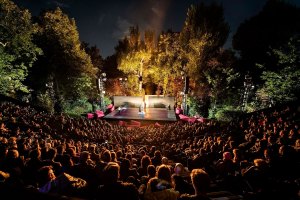The Secret Garden at Pitlochry Festival Theatre – review
Elizabeth Newman’s adaptation of the Frances Hodgson Burnett classic continues open-air performances through to 19 August

I can’t say I wasn’t warned. Outdoor theatre is a risk anywhere north of the English Channel, even in summer, but attending an open-air production in the Scottish Highlands feels a bit like taking your life in your hands. I watched the torrential downpour that preceded the al fresco staging of The Secret Garden from the comfort of the theatre café, and headed for the outdoor performance area with more trepidation than anticipation as I clutched my umbrella and zipped my raincoat tight.
In the event, however, the rain eased off and didn’t interrupt the show with anything more than a little shower. It certainly didn’t dampen the choice to stage this new play outdoors in Pitlochry Festival Theatre’s garden amphitheatre. Pitlochry has long been known as “Scotland’s theatre in the hills”, so it makes perfect sense to capitalise on that by staging productions in its landscaped garden. Their raked wooden amphitheatre is a lovely space, one that Ben Occhipinti’s production makes the most of with its selective use of the open views and lots of little transformational touches to mark the passing of the seasons.
And what more appropriate setting could there be for Frances Hodgson Burnett’s ever-popular tale of the healing power of nature? This new adaptation by Elizabeth Newman, the theatre’s artistic director, retains all the essentials of the original novel but trims a lot of the detail so that it doesn’t hang about, bringing in the whole thing at around 90 minutes, including an interval. It’s appealingly crisp, which is helpful for the younger members of the audience on their summer holiday, and it doesn’t shun the novel’s all-important use of Yorkshire dialect. It’s a lovely thing to breathe in the Highland nature as you watch, too, so that the setting seems to become a part of the wider production.
The staging embraces simplicity, with a very small number of props to suggest individual locations, and some winningly cute puppet animals to supplement the human cast. There is an appealing directness to the actors’ performances too, and that adds to the childlike nature of the show. Blythe Jandoo effectively traces Mary’s journey from the angry orphan to the generous, warm-spirited girl of the ending. Jack Ward does the same with the role of Colin Craven, though he can’t do anything about the fact that his character begins his journey as one of the limpest, least appealing characters in children’s literature. Robbie Scott’s Dickon is simple and direct, as is Trudy Ward’s sympathetic Martha. Oliver Cookson and Shona White play the older domestic staff with salt-of-the-earth gruffness, and Matthew Churcher makes a warmly humane narrator.
Only at the close does the play feel rather curt. The ending comes rather abruptly, and the air-fairy “magic” that becomes so central to the play’s conclusion feels rather poorly prepared for. However, it’s a play and production that retains its own distinctive sense of charm, and its outdoor setting will help it cast its own spell, even when it rains.















